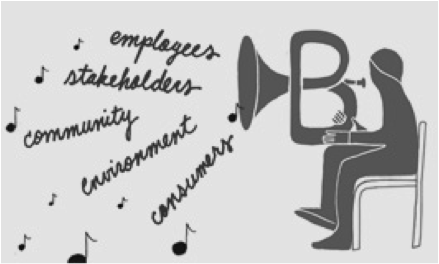B Corporations: Driving a New Ecology of Commerce
by Elsa Jagniecki | January 16, 2012

“I hope that five years from now, ten years from now, we’ll look back and say this was the start of the revolution. The existing paradigm isn’t working anymore—this is the future.”
—Yvon Chouinard, founder and CEO of outdoor clothing company Patagonia
There’s a growing buzz about a new kind of business model that is centered around building better business, social enterprise, and corporate policy.
What are B Corps?
So-called Benefit Corporations (a.k.a. "B Corps") are leaders in a new type of commerce that uses business as a lever to solve social and environmental problems. B Corps are about changing (or rather growing) corporate laws, standards, systems, and cultures—evolving capitalism to incorporate greater value for consumers, companies, and other stakeholders.
B Corps ask the question: “How do we use business as a tool for social change?”
The answer is straightforward: Business can promote social change by harnessing the growing market demand for a “new” or “creative” capitalism, using an approach that’s backed by solid certification and standards. These rigorous metrics then underpin each business’s unique story of becoming greener or more sustainable.
“Governments and nonprofits are necessary but insufficient to solve today’s most pressing problems,” says Jay Coen Gilbert, who co-founded the nonprofit B Lab in 2007 with two friends from Stanford. ”Business is the most powerful force on the planet and can be a positive instrument for change.” (To learn more about Gilbert's vision to harness the power of business to solve society's problems, view below or click here.)
Philadelphia-based B Lab is the brainchild behind the B Corps movement, and the institution that helps businesses make the change. It drives systematic change in how business works through three main initiatives:
- Building a community of Certified B Corporations to make it easier for people to tell the difference between “good companies” and just good marketing;
- Accelerating growth in the “impact investing” asset class—B Lab’s Global Impact Investment Rating System analyses the performance of companies that are not only socially responsible, but that also actively create positive social and environmental impact; and
- Promoting legislation to create a new corporate form that meets higher standards of purpose, accountability, and transparency.
B Corps have been growing in number across the United States for years, leading the way in social responsibility and higher performance standards. They are now pushing toward a tipping point in how ethical business happens, by setting socially and environmentally based goals rather than focusing purely on economic return-on-investment.
So far, B Lab has certified more than 515 B Corp companies, corporations, and organizations, which together boast more than $2.9 billion in revenue. They include businesses in some 60 different industries, from baked goods and the arts to plastics and capital investments. Among the B Corp ranks are outdoor clothing retailer Patagonia, travel networking group CouchSurfing International, herbal tea and supplement provider Traditional Medicinals, solar energy installer Namaste Solar, and Portland, Oregon-based Bamboo Sushi, the first certified, sustainable sushi restaurant in the world.
How do you become a B Corp?
By registering as a Benefit Corporation, a company commits itself to:
- Creating a material positive impact on society and the environment;
- Expanding its fiduciary duty to require consideration of non-financial interests when making decisions; and
- Reporting on its overall social and environmental performance using recognized third-party standards.
To become a Certified B Corp, a company must go through a rigorous B Impact Assessment, which involves an initial audit followed by a guided process to become more resource efficient and socially responsible. Once a business undergoes this assessment, anyone can check on its performance data and better understand the practices behind its products and services. Certification must be renewed every two years.
A business has to score at least 80 points out of 200 to become B Corp-certified, but companies are encouraged to push their limits and strive for ever-greater resource efficiency, social responsibility, and community investment. Most B Corps do seek to go further, driven by an expanding green market that favors entrepreneurial sustainability.
Why do companies want to be B Corps?
Even during a time of economic uncertainty, companies are seeking sustainable business paths because of the growing consumer demand for better business. Increasingly, the market demands that companies “do good” for society and the environment if they want to remain competitive. Especially with more products originating from unlabeled sources, more people are looking for clear standards, ratings, and certifications that affirm the quality, safety, and "green-ness" of the things they buy.
A 2007 study from the Natural Marketing Institute (NMI) reported that 58 percent of Americans are more likely to buy products and services from a company that is mindful of its social and ecological impacts. Even more, NMI found that 68 million American adults make purchasing decisions based on their personal, social, and environmental values. The research found that consumers are willing to spend up to 20 percent more for environmentally sound products and services.
By becoming B Corp-certified, a business is able to solidly offer its clients, members, or constituents value-added products and services—”feel good” elements that are additional to what they provided traditionally. Some businesses might be aligned with certain environmental or social justice principles, such as using organic or fair trade inputs and avoiding child labor, or they may simply see the business case in crafting a more a socially responsible model.
The founders of the Nest Collective, a California-based group that hosts consumer-product brands focused on nourishing babies, toddlers, and kids with healthy, organic foods, note that Nest “became a B Corporation because it represents a new way of conducting business and aligns with our mission of nurturing people and the planet. Being part of the B-Corp community helps us to stay abreast of best practices in fostering our goal of being a triple-bottom-line business, not just in terms of sustainability, but also transparency.”
Similarly, Maria Uspenski. founder and owner of The Tea Spot in Boulder, Colorado, explains that her looseleaf tea and tea accessories business "became a B Corp because we see it as a process that can help us build an even more sustainable and valuable company for our employees, stakeholders, and community.” The Tea Spot works to ensure that its products uphold clean, sustainable, and fair manufacturing standards, and its message is simple and powerful: tea in its freshest form renders incredible flavor, unmatched health benefits, and is eco-friendly.
Not just business: How B Corps are changing the corporate playing field
The B Corp movement is also driving broader, structural change in the corporate world. So far, seven states, including California, Hawaii, Virginia, Maryland, Vermont, and New Jersey, have adopted legislation designating a new legal status for Benefit Corporations, and more states have this legislation pending. This is a significant step, given that state laws have traditionally required corporations to prioritize the financial interests of shareholders over the interests of workers, communities, and the environment.
Under the new B Corp legal structure, businesses gain a way of integrating social and environmental considerations into their operations while also ensuring protection from shareholders who are concerned solely about protecting their financial interests.
 On January 3, 2012, outdoor clothing retailer Patagonia become California’s first registered B Corp. In a press release announcing the certification, CEO and founder Yvon Chouinard observed that becoming a B Corporation validates what he set out to do when he first started the company, and protects its mission into the future: “Patagonia is trying to build a company that could last 100 years. Benefit corporation legislation creates the legal framework to enable mission-driven companies like Patagonia to stay mission-driven through succession, capital raises, and even changes in ownership, by institutionalizing the values, culture, processes, and high standards put in place by founding entrepreneurs.”
On January 3, 2012, outdoor clothing retailer Patagonia become California’s first registered B Corp. In a press release announcing the certification, CEO and founder Yvon Chouinard observed that becoming a B Corporation validates what he set out to do when he first started the company, and protects its mission into the future: “Patagonia is trying to build a company that could last 100 years. Benefit corporation legislation creates the legal framework to enable mission-driven companies like Patagonia to stay mission-driven through succession, capital raises, and even changes in ownership, by institutionalizing the values, culture, processes, and high standards put in place by founding entrepreneurs.”
With opportunities like these, what company wouldn't want to become a B Corp?
Elsa Jagniecki is founder and lead consultant at Bright Green, a sustainability consulting firm based in Durango, Colorado that offers practical, innovative, and creative solutions to help businesses go above and beyond – generating a lasting positive impact in commerce and the community.

